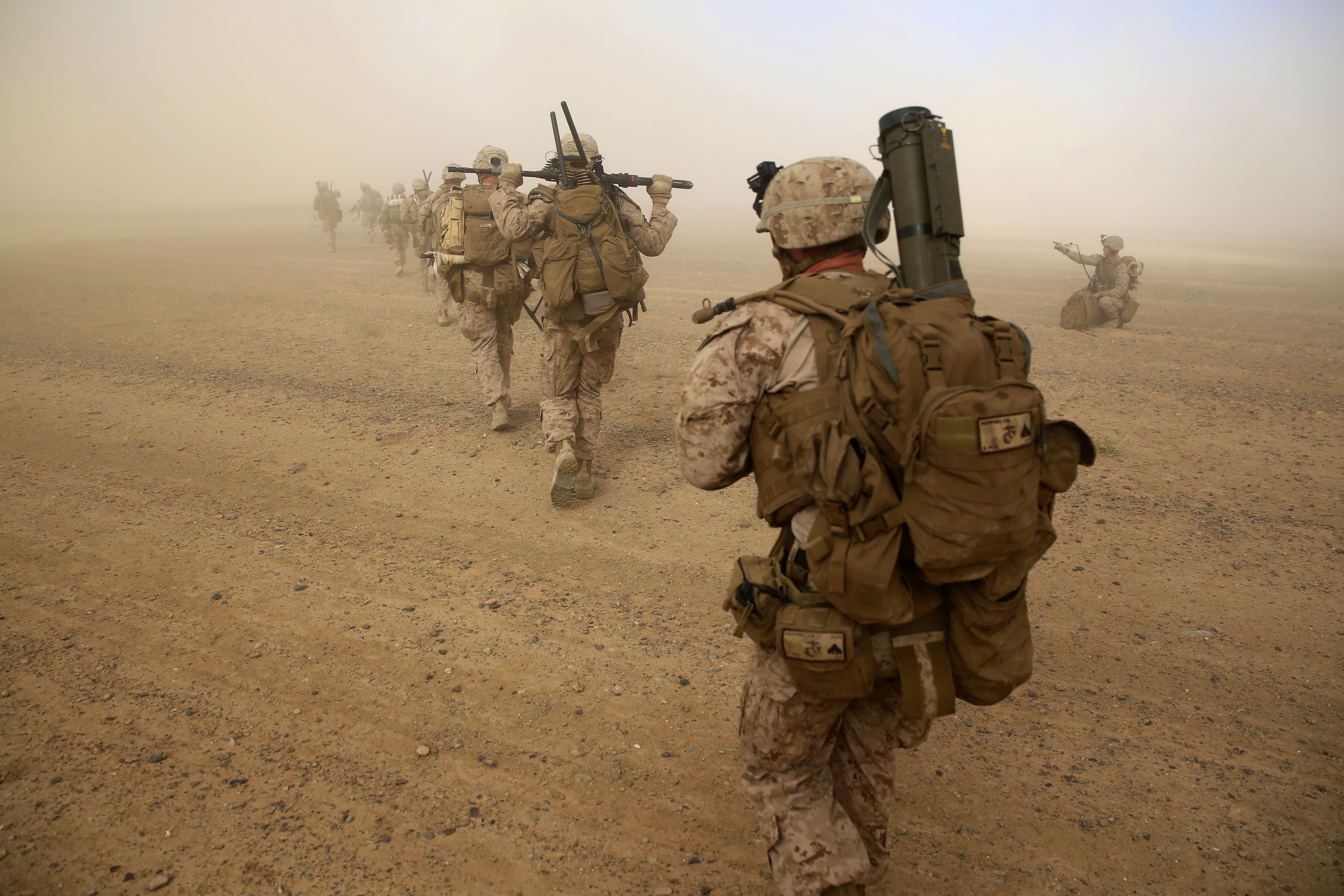The Marine Corps wants to enhance the combat power of its squad leaders, saying they're the first line of offense against drones and network jamming should the Corps battle more trained and powerful military adversaries.
Since 2004, Marines have been trained and equipped to battle insurgents in Iraq and Afghanistan, but these enemy fighters don't have nearly as many tools at their disposal as professional militaries, Marine Commandant Gen. Robert Neller said.
"That insurgent didn't have electronic warfare," Neller said Wednesday at the Marine Corps League's Modern Day Marine expo at Marine Corps Base Quantico, Virginia. "That insurgent didn't have an air force. That insurgent didn't have effective indirect fire. That insurgent didn't have the ability to take out our networks or jam our comms."
Neller unveiled the Marine Corps Operating Concept, which looks at what type of opponents Marines will face in 10 years. The vision is an outgrowth of Expeditionary Force 21, the service's previous roadmap for the future.
The operating concept updates maneuver warfare for the 21st Century by emphasizing that in future wars, Marines will fight in complex urban environments against enemies that are skilled at using information as a weapon and jamming Marines' communications and navigation systems, officials said.
Defense Secretary Ash Carter has identified four potential adversaries whose forces Marines must train to combat: China, Russia, North Korea and Iran.
Although each of those countries has the ability to destroy ships and landing craft far from shore, Neller said amphibious warfare still will be a part of future operations.
"That’s not anything new," he told reporters on Wednesday. "You’re going to have to set the conditions to where you can land the landing force, or you’re going have to find a place where you can land, where that threat may be non-existent."
'Stronger and smarter'
Junior Marines should expect to train with the Navy much more than they have in the past 10 to 12 years, said Lt. Gen. Robert Walsh, head of Marine Corps Combat Development Command.
The operating concept also calls for "exploiting the capabilities of our individual Marines" by giving them much more technology to work with, Walsh told reporters.
"They can handle it," he said. "Why do we want them to handle it? Because we want to maneuver in all domains … not only spatially on the ground or in the air, but if we can maneuver in these other domains — information warfare, cyber, electronic warfare, signals intelligence – being able to sense, understand the environment, make sense of it and quickly act, that’s going to allow us to operate in different ways."
The concept recognizes that the service will expect a lot more from Marines on the ground, said Maj. Jim Geiger, of the Marine Corps’ Ellis Group, an internal think tank that explores future warfighting scenarios.
"They are going to need to be stronger and smarter going forward to do the things that are going to be needed to fight in this environment," Geiger told reporters on Tuesday. "We’re working now on training them up to those standards, but the standards are high for a reason."
The Marine Corps recognizes that its ability to maneuver on the battlefield rests with competence of each individual Marine, so the operating concept emphasizes the importance of recruiting and retaining the right people, said Doug King, director of the Ellis Group.
Going forward, squad leaders may be equipped with technology to counter enemy drones and information warfare, all while running the squad, making a squad leader will be "the busiest person on the battlefield," King said at a briefing before Neller’s speech.
"So we’ve got to invest in that junior leader," King said. "We need to make sure that’s the right person and they’re trained properly and they have enough resources."
When facing future adversaries, Marines will need to protect their communications network, King said. The enemy will not only try to jam Marines’ communications, but they will also try to hack into it and find out what Marines’ plans are, he said.
"Most important is to protect our ability to command and control," King said. "That’s what’s going to enable us to maneuver, fight and win. We want to be able to protect the network as much as possible."
But the Marines also realize that there will be times when the enemy will be able to bring the network down, so Marines must revive older methods of communications that they have not used much of in recent years, officials said.
The Marines are also looking at changes to how Marine Air-Ground Task Forces are organized and how the service brings together MAGTF elements from around the world to respond to a crisis, King said.
"We’re not necessarily going to have the luxury of going to Saudi Arabia or Kuwait, establishing a base for six months, husbanding all of our resources, setting it up the way we want to set up and then striking out to conduct operations," he said. "If we have to go somewhere, we might find that we have our MEF [Marine Expeditionary Force] headquarters in one country, elements of our aviation scattered amongst a couple other countries; we’re scattered across the ocean in different bases, and we have our ground forces working in a couple of different areas."
Jeff Schogol covers Marine Corps leadership, aviation and the Pacific for Marine Corps Times. He can be reached at jschogol@marinecorpstimes.com.




